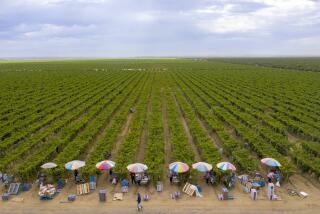Farmers Say They’ve Got Fruit but No Labor
YAKIMA, Wash. — While much of the country frets about too many illegal immigrants, farmers in this famed apple-growing region east of the Cascade Range complain they can no longer find enough.
During the last two years, Yakima-area apple growers were so short of the migrant field hands they rely on to prune and pick their prized crop that a few brought in workers from Thailand.
Others said they never did find enough workers and watched in anguish as precious fruit was left dangling on trees.
This summer, with farmers expecting a bountiful apple crop, they also predict that the worker shortage will worsen, threatening a hand-harvesting industry valued at more than $1.5 billion in Washington state. In the last big-crop year, growers employed an estimated 42,300 seasonal apple workers, according to state officials.
“I hear people saying, ‘We don’t have enough workers now,’ ” said family apple farmer Larry Knudson. And April is a slow month, he added. “If that’s now, what is it going to be like when we ratchet up our seasonal programs in June?”
The farmers’ labor problems are at least partly due to the tightening of security along the U.S.-Mexico border in recent years. But they also illuminate a new reality: Illegal immigrants are increasingly shunning agricultural work in favor of better-paying opportunities in other bottom-rung occupations.
The employers who are hiring illegal immigrants away from farmers, notably in construction and manufacturing, also often pay poor wages for backbreaking tasks. But they offer steadier hours than seasonal farm work, which has served as the first job in America for countless newcomers over the last century.
“The trend line on labor supply -- it’s going down,” said Mike Gempler, executive director of the Washington Growers League. “If a grower can have people that come into his or her ranch on their own dime, who show [citizenship] documents that appear to be legitimate, it’s never going to get better than that. The alternative, guest-worker programs, is always going to be more expensive. But that’s the only real alternative.”
Citing field-hand shortages in communities such as Yakima, national agribusiness organizations are lobbying Congress for a dramatically expanded and simplified guest-worker program, arguing that constricting illegal immigration without ensuring an alternative supply of cheap labor would lead to economic ruin for many farmers.
Such a proposal, titled AgJobs, is part of the primary immigration bill the Senate is considering and has garnered bipartisan support among Western governors and members of Congress. Supporters say a simplified guest-worker program is crucial to guaranteeing a domestically grown food supply; without it, they say, many crops, including lettuce, apples and grapes, will no longer be cultivated in this country.
But some worker advocates as well as illegal immigration opponents question whether there is a true dearth of agricultural laborers, arguing that farmers would find ample help if they paid more.
Apple workers, like most fruit pickers, are typically paid by the amount they harvest instead of hourly. According to statistics compiled by Washington state, in 2004 agriculture workers averaged about $8,600 a year for about 810 hours of labor -- the equivalent of about $10.40 an hour.
Although it is not clear how many apple pickers are in the country illegally -- farmers say workers typically show valid-looking immigration documents -- the U.S. government has estimated that about 70% of such seasonal farmworkers are illegal immigrants.
Some economists have questioned whether the federal government should be propping up labor-intensive farm operations that would have had to adapt long ago if not for low-cost illegal immigrant workers.
Philip L. Martin, a professor of agricultural economics at UC Davis, said that if the government succeeded in cutting off the influx of illegal immigrants, some farmers would require an expanded guest-worker program to stay in business.
But for the program to be successful and not just create a form of indentured servitude, Martin said, it would have to compel the farmers to phase out foreign workers and find better ways to harvest their crops.
Martin notes that tomato farmers predicted doom when the federal government ended the bracero guest-worker program of 1942 to 1964, which addressed World War II labor shortages. But the tomato industry adapted, mechanizing its harvesting processes, and today produces roughly five times as many tomatoes with one-tenth the workers.
“The government is not going to hand [farmers] big capital losses, which is what would happen in a place like Yakima” if illegal immigration suddenly ended, Martin said.
“Maybe machines could only shake loose 60% of the apples on a tree, less than what workers harvest,” he added. “But a technological advance like that could still end up being more profitable if it cut labor costs.”
The arrival of Thai workers in Washington state two years ago was at first regarded as a novelty by farmers accustomed to Latino field hands. It then spurred serious debate among farmers about the future of apple cultivation in the region, which faces competition from growers in China, Chile and New Zealand.
But the episode eventually became an example of the kind of problems that have historically plagued foreign labor programs. The California-based company bringing in the Thai workers, Global Horizons Inc., was accused of mistreating them. It was fined by the Department of Labor and lost its farm labor contractor license in Washington state.
Last week, the United Farm Workers announced an agreement with Global Horizons aimed at protecting foreign workers. The union, it appears, expects its numbers to grow in the near future.
More to Read
Sign up for Essential California
The most important California stories and recommendations in your inbox every morning.
You may occasionally receive promotional content from the Los Angeles Times.










